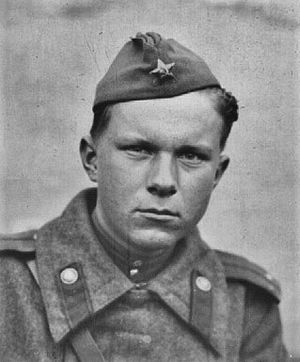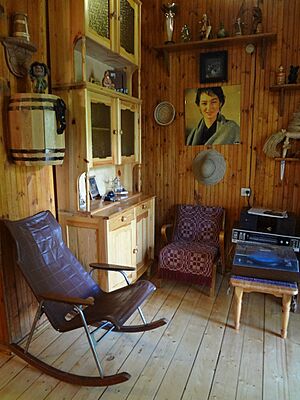Vasil Bykaŭ facts for kids

Vasil Uladzimiravič Bykaŭ (often spelled Vasil Bykov) was a famous writer from Belarus. He was born on June 19, 1924, and passed away on June 22, 2003. He wrote many books and stories, mostly about World War II. His work was very important in both Soviet and Belarusian literature. Many people admired his writing. Even Nobel Prize winners like Joseph Brodsky and Czesław Miłosz suggested him for the Nobel Prize.
Contents
Vasil Bykaŭ's Life and Writing
Early Life and War
Vasil Bykaŭ was born in a village called Byčki in 1924. This village was near Viciebsk. When he was 17, in 1941, Germany attacked the USSR. Vasil was in Ukraine at the time. He joined the Red Army and first helped dig trenches. Later, he fought against the Germans. He became a junior lieutenant.
After the war, Vasil left the army. But he returned to serve again from 1949 to 1955. After that, he became a journalist. He worked for the Hrodna newspaper.
His Famous Stories
In the 1950s, Vasil Bykaŭ started publishing his first stories. Some of his most well-known works include "The Ordeal," "The Obelisk," "To Go and Not Return," and "To Live Till Sunrise." His story "The Ordeal" even inspired a movie. It was called The Ascent and came out in 1977. This film won a big award, the Golden Bear award, at a film festival.
Writing About War
Bykaŭ's writing was very realistic. He showed what battles in World War II were truly like. His stories often focused on a few characters. These characters faced tough choices during the war. They had to deal with enemies and also with challenges within their own Soviet system. This honest way of writing sometimes made some army generals unhappy. But many others praised his brave and truthful stories.
A writer named Michael Glenny said in 1972 that Bykaŭ was a "very courageous and uncompromising writer." Vasil Bykaŭ was one of the most respected writers in the Soviet Union. In 1980, he received the special title of People's Writer of the Byelorussian SSR.
His Legacy
Many of Bykaŭ's stories are available in English. These include "The Dead Feel No Pain," "The Ordeal," "Wolf Pack," and "Sign of Misfortune." He wrote all his books in his native Belarusian language. He even translated some of them into Russian himself.
Vasil Bykaŭ is still very important in his home country. He supported changes and spoke out for what he believed was right. He lived outside Belarus for several years. He was in Finland, then Germany, and the Czech Republic. But he came back home a month before he passed away in 2003. His life and his honest views on war have made his reputation even stronger.
Awards and Recognition
Vasil Bykaŭ received many important awards for his writing and service:
- Order of the Red Star (1944)
- Jakub Kolas State Prize of the Belarusian SSR (for "The Third Rocket," 1964)
- Order of the Red Banner of Labour (1974)
- USSR State Prize (for To Live till Sunrise, 1974)
- Jakub Kolas State Prize of the Belarusian SSR (for "Wolf Pack" and "His battalion," 1978)
- People's Writer of the Belarusian SSR (1980)
- Hero of Socialist Labour (1984)
- Order of Lenin (1984)
- Order of the Patriotic War, 1st class (1985)
- Lenin Prize (for Sign of Misfortune, 1986)
- Order of Friendship of Peoples (1994)
- Order of Francysk Skaryna (Belarus, 1994)
- San-Valentino International Golden Prize (1998)
See also
 In Spanish: Vasil Bykaŭ para niños
In Spanish: Vasil Bykaŭ para niños
- The Wall
- On Black Ice, 1995 film based on short stories by Vasil Bykaŭ
- In the Fog, 2012 film based on Bykaŭ's 1989 story of the same name
 | Jessica Watkins |
 | Robert Henry Lawrence Jr. |
 | Mae Jemison |
 | Sian Proctor |
 | Guion Bluford |


